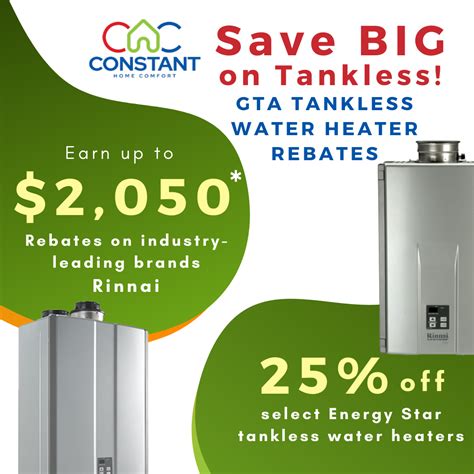In today’s world, where energy conservation and cost savings are paramount, homeowners are increasingly seeking ways to reduce their utility bills. One of the effective solutions that has gained attention is the installation of tankless hot water heaters. These modern systems not only offer uninterrupted hot water supply but also come with the advantage of various rebates and incentives that can significantly lower their purchase and installation costs. In this article, we will explore how tankless hot water rebates can help cut your energy costs.
Understanding Tankless Hot Water Heaters
Tankless hot water heaters, also known as on-demand water heaters, heat water directly without the use of a storage tank. When a hot water tap is turned on, cold water travels through the unit and is heated by either electric coils or a gas burner. This means you get a continuous supply of hot water and never run out during peak usage times.
Why Choose Tankless Over Traditional Water Heaters?
Traditional tank water heaters store a limited amount of hot water in a tank, which means once that hot water is used up, you have to wait for it to reheat. This constant reheating uses energy, leading to higher utility bills. Some advantages of tankless water heaters include:
- Energy Efficiency: Since they heat water on demand, tankless systems use less energy compared to traditional units that keep water heated constantly.
- Space Saving: Tankless systems are smaller than traditional tanks, making them ideal for homes with limited space.
- Longer Lifespan: Tankless heaters typically last longer than traditional water heaters, offering better value in the long run.
Financial Incentives: Tankless Hot Water Rebates
Investing in a tankless water heater comes with a substantial upfront cost, ranging from $1,000 to $3,000, including installation. However, many local governments and utility companies offer rebates and incentives to homeowners who opt for energy-efficient appliances. Such rebates can range anywhere from a few hundred to over a thousand dollars, significantly offsetting the initial investment.
How to Access Tankless Hot Water Rebates
- Research Available Rebates: Start by checking with your local utility company or municipal government. Websites like the Database of State Incentives for Renewables & Efficiency (DSIRE) can provide comprehensive information on available rebates in your region.
- Choose the Right Equipment: Ensure that the tankless heater you choose qualifies for rebates. Look for Energy Star ratings and specific models recommended by your utility provider.
- Follow Application Instructions: Once you have confirmed your rebate eligibility, complete the necessary applications and submit them along with proof of purchase and installation.
Long-Term Benefits of Choosing Tankless Water Heaters
While the immediate cost savings from rebates are attractive, the long-term benefits should not be overlooked. Here are some compelling reasons to switch to a tankless hot water system:
- Lower Energy Bills: As mentioned earlier, the energy efficiency of tankless systems means lower monthly utility bills. Many homeowners report savings of 10-20% on their water heating costs.
- Increased Property Value: Energy-efficient upgrades can enhance the resale value of your home, making it more attractive to potential buyers.
- Environmentally Friendly: Using less energy reduces your carbon footprint and helps in the fight against climate change.
Conclusion
Switching to a tankless hot water heater is undoubtedly a smart investment for homeowners looking to save on energy costs. With the added benefit of available rebates, the initial cost becomes much more manageable. Not only will you enjoy the luxury of an endless supply of hot water, but you will also be contributing to long-term energy savings and environmental sustainability. By taking advantage of these rebates, you can significantly cut your energy costs, making your home more efficient and lowering your utility bills for years to come.
FAQs
1. How much can I save with a tankless hot water heater?
Homeowners can typically save between $100 to $200 per year on energy bills, depending on usage and local energy costs.
2. Are there specific models that qualify for rebates?
Yes, most local utility programs require specific standards for energy efficiency, such as Energy Star ratings. It’s crucial to check with your utility provider for approved models.
3. How can I find local rebates for tankless water heaters?
You can visit the DSIRE website or contact your local utility company directly to inquire about available rebates and programs.
4. Is the installation of a tankless water heater difficult?
While some homeowners may choose to install it themselves, it is recommended to hire a professional plumber to ensure proper installation and compliance with local codes.
5. How long does a tankless water heater last?
With proper maintenance, tankless water heaters can last about 20 years, significantly longer than traditional tank systems, which typically last around 10-15 years.
Download Tankless Hot Water Rebates
